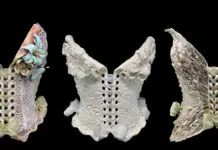He’s been called one of the definitive pioneers of the pop punk world, and as a member of legendary punk bands Descendents and ALL, Stephen Egerton has been touring the national punk scene since it first emerged in the 1970s.
Lucky for us, the punk veteran is now a valuable import for Oklahoma, with his expertise and love for the fast, edgy music he loves serving as a shot of adrenaline for our own music scene.
The Salt Lake City native and now Tulsa resident, who moved to his wife’s hometown seven years ago, says that after so many years of touring and performing, it was important to him that his children be close to their family.
“Once I became a dad, that started taking up more time and made touring less of something that I can do,” he says.
“I’ve grown to like it here. It’s an easy place to raise children, and Tulsa has an incredible music heritage. It’s been an adjustment – definitely different than other places I’ve lived in the past – but it’s worked out great.”
But don’t think that adjusting to the easy going pace of the Sooner state means that he’s slowed down.
Far from it, actually.
In addition to family life, ongoing work with ALL, his instrumental punk band Slorder, and both national and international select weekend shows with the Descendents, Egerton has been busy juggling his production company with solo projects of his own.
He says that his 2010 debut, 7 Degrees of Stephen Egerton, got some “decent press,” but that doesn’t do it justice.
What the 16-track delectable snack for punk enthusiasts got was rave reviews, unleashing what is truly a solo project from the ground up.
Featuring songs written and instruments played and recorded by Egerton alone, it also features collaborations with a treasury of different punk vocalists, highlighting an impressive mix of both the well-known and just coming into their own.
Dipping into the vast pool of personal resources that he has cultivated within the close-knit punk community and finding just the right musicians to help complete his vision was what he calls “pretty organic”: Everyone on the record is someone he knows as a friend.
“My singing skills leave much to be desired, so I decided to farm that job out to my many friends who are far better at that than me. I’ve played with a lot of great bands with so many great guys, so when one would come to mind as I wrote, I would call him up and ask if he wanted to take a crack at it,” Egerton explains.
“I write instrumental music and other music in general, but what I hadn’t put a lot of time into was singing and writing words. That’s my struggle, and as I grow as a musician, that’s something I’m trying to get further and further with.”
The do-it-yourself process that Egerton uses to create his projects is signature to traditional punk ethic, but is becoming more mainstream with the help of the Internet and modern technology.
With the benefit of mass online social networking, he says the direct connectivity between artists and the people who like and support their music has exploded, and inexpensive technology has changed the recording studio landscape dramatically, accelerating the process at a breakneck pace.
“In my band’s time, we had huge mailing lists, and we’d get together and sit around physically stamping envelopes to send out to fans and other bands in order to try to help each other. The Internet has changed all of that.”
“These days, you can now buy high quality recording equipment – most computers come with the programs – and anybody can record. I find a lot of bands recording themselves more than they used to. That’s part of the reason I started focusing on mixing and mastering records because that’s not a skill that just anybody can do – it’s complicated. It can become a head trip to try to mix your own record,” Egerton says.
With the doors that have opened, Egerton adds that he’s also witnessed a seismic shift in interest in music, with more kids forming bands and taking creative initiative with music than before.
“I see that as sort of an extension of what we’ve lost in giving children a musical education. Kids are learning to do that on their own, and there’s an emphasis on learning how to play instruments. Guitars are selling like crazy. Buy an alternative press magazine and it’s like, ‘Wow there’s no way to keep up with all this,’” he says.
“But it’s a good time for the music scene. I think people are in a position to hear a broader variety – it’s somewhat less pigeonholed now – and it’s very cool in the long run.”
Oklahoma Punk
When people talk Oklahoma punk music history, they first mention N.O.T.A – a Tulsa-based group that’s widely considered to be one of the 1980s’ most influential punk bands. They next namedrop acts that showed up on the radar, but never quite made it big (Brother Inferior, Angry Son and Roustabouts). They even point to the future, where Oklahoma City-based Red City Radio shows potential and promise on the national stage.
But once that talk ends, conversation turns to a snowy night in 1978 when the Sex Pistols played Cain’s Ballroom as part of their one and only, eight-city North American tour.
The Sex Pistols were everything punk music was supposed to be. They were dirty, dogmatic and raw. Their manager, Malcolm McLaren, intentionally booked the band’s first U.S. tour in the Deep South knowing that it would generate interest, and more importantly, controversy. The Tulsa show was to be the band’s second-to-last stop on their first tour. It would turn out to be their second-to-last show ever. The Sex Pistols would break up only weeks later.
After the show, most Tulsans were unimpressed.
“It’s not music. It’s not good for the ears,” whined a frustrated concertgoer.
Tulsa Tribune critic Ellis Widner wrote, “It was too loud, too dull, and the songs were too much alike to make a serious, lasting impact.”
The Pistols’ notorious (and aptly named) bassist Sid Vicious made sure that if the band’s music didn’t leave “a serious, lasting impact,” that his fists sure would. In a move out of the “Be Punk for a Day” stylebook, he punched a hole in the wall at each tour stop. Cain’s was no exception.
When Cain’s remodeled years later, they cut out and framed the destruction for music fans and musicians to see. Only in punk music history can such destruction be so fitting and charming.
– Patrick Nelson

























